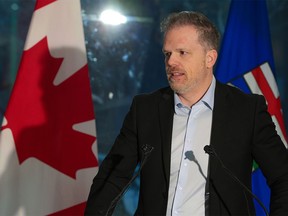Canadians should ask themselves difficult questions about the overstaffing of our ministers’ offices and its effects on our national decisions.

Article content
Chrystia Freeland is 46. Marc Miller he is 25. Mark Holland is 25. Bill Blair is 21. Eisenhower, at the height of World War II, was 24.
Personalized staff.
Article content
Why would Defense Secretary Bill Blair, who oversees our small peacetime army, It requires almost as many staff as Dwight D. Eisenhower, Supreme Commander of the Allies in Europe in 1944? And this is in addition to the personal support that Blair receives from his military and departmental officials.
Advertisement 2
Article content
A little online research reveals that the same thing is true throughout the massive 40-member federal cabinet. Canadians should ask tough questions about the overstaffing of our ministers’ offices and its effects on our national decisions.
Cabinet ministers need policy advice, decision-making support and executive assistance that is prohibited for politically neutral public servants. Perhaps the 24/7 news cycle and increasing stakeholder demands on today’s ministers require a few more staff than in previous times. Let’s admit it. But how many political staff does a minister legitimately need? Are the numbers now so large that leadership effectiveness is compromised?
Here are some numbers, through March, that might surprise you. Marci IenMinister for Women, Gender Equality and Youth, has five policy advisors, four regional advisors, three parliamentary assistants and two communications advisors among her team of 19 people. Mark Holland, health minister – a field that is almost exclusively provincial, to the point where the federal government’s role is basically to send money to the provinces – has nine political advisers, four regional advisers and five communications advisers in his entourage. of more than two dozen. Chrystia Freeland has the absurd number of 21 regional advisors, 10 political advisors and six communication people.
Advertisement 3
Article content
This is in addition to the policy, media and outreach staff provided to each minister by their respective departments. For example, the Department of Finance has branches dedicated to fiscal, economic, tax and social policy, each with advisors and analysts, whose job is to provide expert advice to the minister.
Being political animals themselves, these ministers should be smart enough to politically evaluate their own decisions without the need for a platoon of partisan advisors. In addition, they also have dozens of caucus colleagues who can provide feedback, not to mention their own caucus research office, which provides them with administrative, research, and communications services.
At what point do teams become too large to function effectively? Adding staff increases capacity and production to a certain point, but soon becomes counterproductive as operational problems increase.
Efforts devoted to recruiting, onboarding, training, disseminating knowledge, and refereeing competing personalities and objectives increase dramatically. More and more attention is being paid to internal disputes and collaboration problems rather than external strategic decisions and results. Things get complicated. The real work is not done.
Advertisement 4
Article content
The management literature on optimal team size is abundant. Leadership team expert Jacques Neatby also describes the demoralizing effect that an oversized leadership team has on subordinates. In “The Balloon Executive Team” in it Harvard Business ReviewHe warns: “As CEOs add more members to their team, each fighting to make their priorities prevail, the conflict at the top becomes more visible. With the lack of collaboration at the top on display, staff below are less likely to collaborate across units and may begin to question the quality of their organization’s leadership.”
Brooks’s Law for software development argues that adding people to a project that is already late makes it even later. Prep time, extra management tasks, coordinating communications, cliques, integration challenges, and getting in each other’s way make things worse.
Worrying and worrying about a massive political team, many of whom have barely finished school, certainly detracts from the minister’s important job of addressing national issues. A huge staff (too many people involved in too many things) bothering the public servants who are actually solving the problems does not contribute to good government. There is no compelling management reason for Freeland’s or Blair’s 21 regional advisers to have a staff comparable to Eisenhower’s in 1944.
It’s time to streamline our ministers’ offices.
Mark Johnson He is a general counsel who has worked in the public and private sectors. He was a Conservative candidate in Toronto in the 2021 federal election.
Recommended by Editorial
-

Anderson: Artificial intelligence in public service needs proper oversight
-

A fight and scrutiny of public service not seen in more than 20 years
Article content


